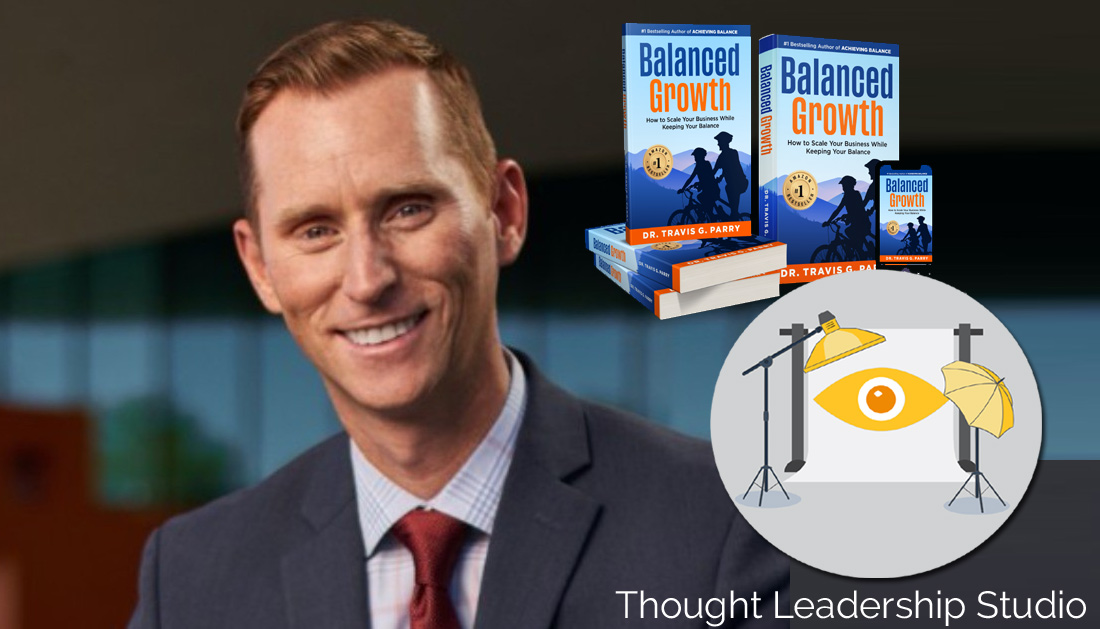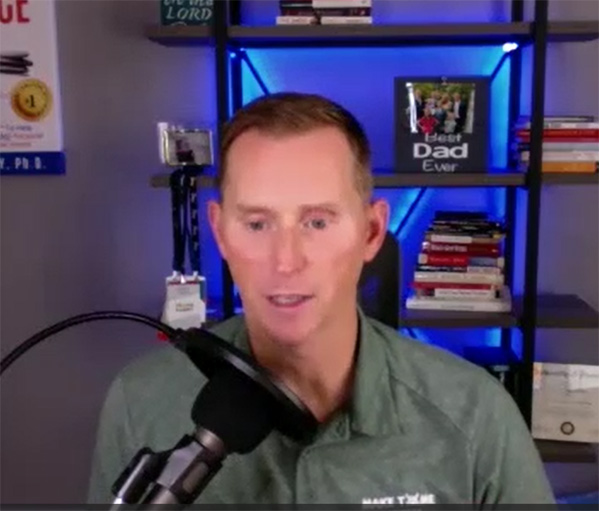Thought Leadership Studio Podcast Episodes:
The Balance Man - Interview with Dr. Travis Parry
Episode 52- Want to grow? Grow with Balance and Get Your Time and Life Back with Insight from Dr. Travis Parry

#authors, #entrepreneurship, #inspiration, #interviews, #lifebalance, #motivation, #thoughtleadershipexamples, #timemanagement, #writing
Or Click here to listen or subscribe on appWhat this episode will do for you
:- Discover the Catalyst for Authorship: Learn what inspired Dr. Travis Parry to become an author and elevate his thought leadership, offering valuable lessons for aspiring writers and those seeking to promote their books effectively..
- Unearth the Power of Self-Awareness: Explore the pivotal role of self-awareness in achieving balance in life and business, and how recognizing the need for change can lead to profound personal and professional growth.
- Embrace the Make Time Method: Dr. Parry introduces the Make Time Method, a practical approach to supercharging productivity while maintaining work-life balance. Learn how to focus on your sweet spot, set boundaries, and maximize your efficiency.
- Overcome Subconscious Fears: Delve into the concept of fear in both the fear of failure and the fear of success. Dr. Parry explains how understanding and addressing these subconscious fears can unlock your full potential.
Dr. Travis Parry
In this episode, we're excited to introduce Dr. Travis Parry, a leader in Time Management
Dr. Travis Parry's journey began as a financial advisor in 2002. He realized his clients needed more than financial advice, leading him to explore personal development. A pivotal moment and the loss of his father prompted him to make life-changing choices.
In 2010, he published "Rescue Your Marriage" and transformed couples on the brink of divorce into thriving partnerships. Dr. Parry introduced Couple Development, helping couples succeed before needing therapy.
Today, he's a sought-after speaker and coach, founding the Make Time Institute to empower individuals to achieve their goals. His research shows that teamwork in couples leads to happiness and financial success.
Currently, Dr. Parry is working on his bestselling book, "Achieving Balance." Beyond his work, he values family, community service, and sports. Welcome to the Thought Leadership Studio as Dr. Travis Parry shares his wisdom in Couple Development and Time Management.
Some of Dr. Parry's coordinates:
Curated Transcript of Interview with Dr. Travis Parry
The following partial transcript is lightly edited for clarity - the full interview is on audio. Click here to listen.
Chris McNeil: I'm Chris McNeil, with Thought Leadership Studio, and I'm sitting here with Dr. Travis Parry, AKA the Balance Man. Travis helps financial professionals grow a balanced business through his keynote speaking and bestselling books (and we're going to talk about those), podcast hosting and guesting and mentoring through the Make Time Institute. Welcome, Travis. Great to have you here.
 Dr. Travis Parry: Thanks for having me. Appreciate it.
Dr. Travis Parry: Thanks for having me. Appreciate it.
Chris McNeil: We're here to talk about your upcoming book, Balanced Growth, which I think would be of great interest to our listeners, but you've also already published a book called Achieving Balance, and from what I know of our audience, a lot of them are either authors who want to promote their books better, or aspiring authors who want to figure out the game before they jump full scale into it.
So what inspired you? What was your pivotal moment? We let talk about pivotal moments here - but was your pivotal moment where you were inspired to become an author and to take things to the next level that way?
Dr. Travis Parry: Number one, thanks for having me. I love talking about pivotal moments of change. I've studied change throughout my life, my career, and help people make change, but also to PhD level, understand human development. I think all of us have a motivating factor, a catalyst per se, to help us move things forward for writing a book.
Catalysts for Life Change and Writing Books
 When I decided I made the decision, I was leaving the financial planning profession and that I was becoming a coach, that's when I made the decision that I need to write a book. One, because I knew books, they just have the potential to show and showcase to the world your thought leadership. Most of us, we think we want to change people incrementally or change ourselves incrementally, and there's a lot of great research around, hey, just the little things they build up over time and they can help you long-term make this great change, which I absolutely agree.
When I decided I made the decision, I was leaving the financial planning profession and that I was becoming a coach, that's when I made the decision that I need to write a book. One, because I knew books, they just have the potential to show and showcase to the world your thought leadership. Most of us, we think we want to change people incrementally or change ourselves incrementally, and there's a lot of great research around, hey, just the little things they build up over time and they can help you long-term make this great change, which I absolutely agree.
I think one of the problems though with that mindset is that we have to have an incremental mindset that I'm just going to change a little bit. What I have found is when we can latch on to these catalysts, these moments that help us move, we can have great big, huge ideas and focus on that big idea to help others change. My idea was as a financial advisor, I'm helping all these clients of mine with their money, but money's related to their health, it's related to their relationship, it's related to their spirituality, it's related to all these other aspects that quite frankly, I wasn't trained on.
And as I started to see problems in all those areas, it really got me thinking there's more for me to learn and there's more for me to help. So as I broke away, as a financial advisor became a balanced coach, I knew that I needed to help others with these same issues and really focus on goals in every aspect of life.
Chris McNeil: So it was the power of that idea. And you find that ideas take on a life of their own, especially when they're encapsulated in the pages of a book. And they end up being kind of the entity that goes out there as your representative and shifting minds maybe ahead of you even speaking with people, because we take on this identity...
The Concept of the Attractive Character in Marketing
Dr. Travis Parry: Yeah, I think we take on the identity, and I think as I've been studying marketing for the last several years, it's one thing to have an idea, it's another to actually bring it to market so that people A, know who you are, B, know how to get in contact with you and want to work with you. I've realized that brands while important, when you can attach them to what Russell Brunson calls an attractive character, now I'm not talking physically attractive.
You have to be somehow good looking or whatnot. Of course it helps. And so that's a part of charisma and things, but to be real with people, to be personal. You see a lot of social media and people talking about this, they use a different term for it. They may use vulnerability or they may talk about just opening up and behind the curtain type of thing.
But the more that you as the attractive character for your business as a thought leader can let people in to know about you and who you are, the more that they will connect and want to connect with you and you'll become the brand. So that's why I'm The Balance Man. I found that I can talk about balance all day long and I've written a book called Achieving Balance and writing another book called Balanced Growth, how to Grow Your Business by keeping that balance.
But if I'm not the guy who can illustrate what balance looks like and can be showing the world how the business is growing, even if I'm only working 25 hours a week and taking 15, 16 weeks off a year, if I can't do that and people won't really relate, they won't relate to my brand MakeTime Institute, they're going to relate more to Travis Parry who is the attractive character of the company.
Chris McNeil: Right. Otherwise it'd be like a personal trainer who smokes and drinks and is a hundred pounds overweight.
Dr. Travis Parry: Exactly.
Chris McNeil: People look for folks to role model. That's a big part of learning, walking your talk. So how much of it is coming from what I might call the belief system that wealth is denominated in multiple forms and money is certainly one of them, but it's not the only one ... but if you have the rest, money generally comes along with it?
 Dr. Travis Parry: Yeah, I would say when I look at the balance methodology, we've come up, we've come with something we call the make time method where most of us, we use so much of our time in work in attracting wealth and bringing wealth into our life that we become workaholics and our society is okay with it. Our society is like, yeah, it's fine. In fact, we wear like a badge of honor sometimes. I'm a workaholic and I'm proud of it. I can work from anywhere now, and that's a great thing.
Dr. Travis Parry: Yeah, I would say when I look at the balance methodology, we've come up, we've come with something we call the make time method where most of us, we use so much of our time in work in attracting wealth and bringing wealth into our life that we become workaholics and our society is okay with it. Our society is like, yeah, it's fine. In fact, we wear like a badge of honor sometimes. I'm a workaholic and I'm proud of it. I can work from anywhere now, and that's a great thing.
Yet at the same time, if we're not making time for the highest priorities in our lives, which are typically our health, our spiritual, physical, mental health, our relationships, spouse, family, friends, if we're not doing those things that really are most important to us, then we're creating stress in our own life and we're also neglecting those aspects of our life that eventually will crumble, they'll break, they fall apart, whatever you want to call it.
It's been really sad to interview over energizing, but sad to see over a thousand interviews we've done for now achieving balance and balance growth, asking people about what is balance and what have they struggled with. And a lot have come to the point where they didn't realize they were workaholics until two or three marriages in.
Chris McNeil: So self-awareness is a big part of it then.
Dr. Travis Parry: Huge, huge part of change is going "Well, wow, I actually need help."
Chris McNeil: Sure
Dr. Travis Parry: I'm in a spot where this is a problem for me. I had a self-awareness pivotal moment you like to talk about. When my father who was 49 was on a mountain bike ride, just normal average mountain bike ride he normally does every day, and he died very suddenly of a heart attack on that ride.
Chris McNeil: I'm sorry to hear that.
Dr. Travis Parry: Oh, I appreciate that. And I detail it more in achieving balances. The intro, we talk about how that really helped me, but it was a life changing experience for our entire family, for me to look at my life as a 26 year old and say, what in the world, I didn't ever think that this would ever be part of my genetics or lifestyle, that this would somehow creep into someone who's that healthy and I'm just like my dad.
I'm healthy, I'm active and fit, and what do I need to do? So that began this journey of self-reflection and that was the catalyst to say, okay, it's now time to have way better and get out of the workaholic trap that I was in.
Chris McNeil: And part of what I'm understanding, and correct me if I'm wrong, is that by stepping back, becoming more self-aware, assessing the need to balance and balancing these things, the things that you were sacrificing that balance for before actually perform better.
Dr. Travis Parry: Yeah, precisely that.
Chris McNeil: But you're going against the grain a little bit of some deeply ingrained beliefs in society where we're just being driven to do more and do more, but sometimes do less and be aware more perhaps. Or how would you phrase that? What would be those first steps? If someone's listening to this and wondering, well, I only worked 120 hours last week, I wonder if I'm out of balance, how would they know that and what would be some initial steps they might take to address things?
Dr. Travis Parry: On average, entrepreneurs work 72 hours per week.
Chris McNeil: That's it?
Dr. Travis Parry: That's average.
Chris McNeil: I'm joking. That's a lot.
Dr. Travis Parry: Yeah, it's a lot. A typical W2 employee is working 31 to be full-time, 40 is pretty average, so it's a different lifestyle. They're putting blood, sweat, tears, extra hours over the weekends at nights. And this idea that you have to somehow be a workaholic to start a business is baloney.
Freedom from Getting Time Back
It is an idea that I think a lot of thought leaders like to put out that look how great I am and look what I've done to sacrifice and get here. And everybody loves a good story of sacrifice. Everybody loves the story of someone who's down and out, who's been able to beat all odds and race to the top. It's just storytelling. The reality is if you look into a lot of the lives of some very famous influencers, they're not married any longer, they don't have a relationship with their children.
Their health has gone to pot. They have got a lot of problems internally, mentally, emotionally that they're struggling with because they've put all of that on hold. The question we have to ask ourselves is do we want to be mega wealthy and mega this or the other famous and influential, or do we want to live our highest priorities and have internal balance and the stress, the internal stress of constantly wanting to be one person but striving to be another that can go away? That's balance.
So what I've found is the MakeTime method, this is the practical side. What can we do? The make time method is simply this. Be super productive at work. Most of us, especially because we're entrepreneurs, we're business owners, we're thought leaders. We think we have to spend all this time, but most of us have five main activities that if we just stuck to those and did nothing else, deleted, delegated, minimized, or use automation to take care of all the other things, build great team along with this, it's fine that we would just focus on those five.
 We would be three to five times more productive than we are today. I started as a financial advisor and I was told, you got to work nights, you got to work weekends, you have to just for the first five years, you're not going to make it. And in that very first year, I had my best year ever and some of the best years that anyone else has had. We had some rankings that we looked at throughout the whole company and I was in the top 10%. I was working less than everybody else on the team. I was not working nights, I was not working weekends. I figured out how to be more productive. I hired people when I was an intern. I was hiring people to work for me because I knew if I just showed up and found people that were my ideal clients, I worked with them, got referrals, everyone else could do the paperwork, other people could do the phone calls, other people could do underwriting, et cetera, et cetera.
We would be three to five times more productive than we are today. I started as a financial advisor and I was told, you got to work nights, you got to work weekends, you have to just for the first five years, you're not going to make it. And in that very first year, I had my best year ever and some of the best years that anyone else has had. We had some rankings that we looked at throughout the whole company and I was in the top 10%. I was working less than everybody else on the team. I was not working nights, I was not working weekends. I figured out how to be more productive. I hired people when I was an intern. I was hiring people to work for me because I knew if I just showed up and found people that were my ideal clients, I worked with them, got referrals, everyone else could do the paperwork, other people could do the phone calls, other people could do underwriting, et cetera, et cetera.
So I figured out very early if I could be more productive, I could spend less time, which means I can mountain bike more. I could be with my kids more. I could serve in my church, in my community, hang out with friends, whatever. But there's that ego that says, no, no, no, you got to do more to have more. And you've got to be that sought after person all the time that people go to. That's a very dangerous path. So number one, we're productive.
Chris McNeil: Awesome. I don't mean to interrupt you, I'm just want to regurgitate a little bit to encapsulate both for myself and for the listener, and make sure we're catching some key points here. And one of them is separating output from how much time you work so you don't judge your productivity by, I work this many hours a day. You judge it by how much you achieved and maybe that is related to the belief that work will expand to whatever time you allot for it. And if you put some boundaries around it, and actually it relates a weird personal habit that just came to me intuitively once, because I'm a musician and I'm not performing professionally now, but I have during times of my life and it's a lot of fun, and I realized that I'm doing certain kinds of work, like writing content and such. Instead of doing it straight through for a few hours, if I do it 20 minutes and then go practice guitar for 10 minutes, I actually achieve more.
And I don't know if that's something about the left right brain going into a different part of the brain to get a rest for that. So I unconsciously maybe think of things that then come out in the next phase of content. I don't know, but that's been very powerful for me to block off time. I achieve more that way. Do you find that's a dynamic?
Parkinson's Law
Dr. Travis Parry:100%. So what you're talking about is Parkinson's law, right? And the amount of time that we set to do a project and work for a client, prepare for a speech or write a book, that's how long it's going to take us. If I told you my next book I'm going to have done in two weeks, I'd get it done in two weeks. If I tell you it's coming out at the end of the year, which it is, it's going to come out at the end of the year, I'm going to set my timeframe. So that said, with some exceptions, most of us, that's how we operate. We give ourselves deadlines, we give ourselves timeframes, and we time block, we move backwards.
 If we can focus on what I call your sweet spot, your top five activities that are most effective, most productive, that's the Pareto principle. It's the 80 20 rule. Most of my clients I've ever worked with, they're 20, 25% in their work. Sweet spot, their top five, that's it, 20 to 25% on an weekly average. Why? Because they let these other things that they should delegate, delete, automate, minimize in, because they feel like they have to take care of everything. They don't know how to delegate. They don't know how to create systems and processes in place so their business can keep working. You mentioned something, oh, sorry.
If we can focus on what I call your sweet spot, your top five activities that are most effective, most productive, that's the Pareto principle. It's the 80 20 rule. Most of my clients I've ever worked with, they're 20, 25% in their work. Sweet spot, their top five, that's it, 20 to 25% on an weekly average. Why? Because they let these other things that they should delegate, delete, automate, minimize in, because they feel like they have to take care of everything. They don't know how to delegate. They don't know how to create systems and processes in place so their business can keep working. You mentioned something, oh, sorry.
Chris McNeil: "I'm running this auto repair shop and I have a chain of 10 of them, but nobody can change the bolts on a wheel like I can." Is that the thing we're talking about?
Dr. Travis Parry:Right. That is perfect. That's a great analogy. It's like really you're going to change every tire. That's not ownership. I like to look at business in several ways. I love soccer. I played soccer growing up. It doesn't matter what sport you played, you can use the analogy. If you're on the field and you're running around playing offense and you're playing defense and you're goalie, if you're playing all the positions, then you're not the coach on the side of the field, you know, calling plays and encouraging and organizing.
You're also not the guy up in the glass booth in the VIP lounge eating your four course meal while you're watching the game. That's where the owners are. The owners are up in the booth, the CEOs, the C-suite, they're on the sidelines, the employees are on the field. They're the ones who are doing really a lot of the work on the field.
They're performing. And you just have to ask yourself, what kind of business owner am I? Because if you're on the field, then you probably have a practice. If you're on the sideline and you're doing a lot of the coaching, you're probably in C-suite position. You're in a managerial position. If you're truly just a business owner, then you own the business and you're checking in, Hey, how's the coaching doing? What's the C-suite up to? What are the managers involved in? It doesn't matter how big the business is, doesn't matter if it's private or public, the concept is sound.
So in order to decide where you want to be, you have to have boundaries. You mentioned this a little bit earlier. You can be super productive. But what I find is a lot of people, they allow that productivity to say, Ooh, now I can work more and get more done. And so instead of taking time off, going on vacations, relaxing and playing their guitar or doing whatever it is to release the stress of daily work, they just work more. And now they know how to be productive. Now they're what I call a productive workaholic. They're working 70 hours a week and they just can't stop. And that can be addictive and that can definitely be diagnosed
Chris McNeil: CM (18:46): Yeah. And then you're trying to chop down the tree or saw the tree with a really worn out saw, you're never taking time out. Stephen Covey's words.
Dr. Travis Parry: Yeah, it's a very good truism.
Chris McNeil: ... to sharpen the saw. I'm also getting a bit about the need to be an organizational thinker, systems thinker, so to speak, and be able to step back and design systems to take up the work that you were doing and maybe address the belief systems of "I have to do it all. Nobody can do it as well as me." Or, "I have to be working all the time to succeed."
... and step back and maybe ask things like, "Where did those come from? How do I know that? Is that really true? And what kind of belief systems would you replace those with?" If you had a totally malleable client hooked up to a neuroplasticity machine where you could program him to think whatever way you'd want about balance his own best interests or her own best interests, what kind of belief systems would you program in?
Dr. Travis Parry: Yeah, those are good questions. I think to address the belief systems, most of us are stuck in two different categories of fear. I talk about this at the end of my book, achieving balance, talk about mindset. Unfortunately, a lot of us are motivated by fear. Fear is a great short-term motivator and it's a horrible servant because over time you can become accustomed to it of just living in fear and you make decisions out of fear. The best motivator by far is love.
And that internal motivation, love could be of God, love of an appreciation for your physical body, just the fact that you have one and you can operate and it's healthy and love of family and friends. Again, it's comes back to those balanced motivators. I call those your internal motivation. When the internal motivation or drive for you to succeed in these other areas are greater than your drive to succeed in work, then you'll have a comfortable boundary.
The Fear Tree
I suggest people decide, how many hours do you want to work? Okay, 30 hours a week, great. Now build in boundaries of all these other areas when you're going to do these other things in an ideal calendar, but they're afraid. And so you know what they're going to do is they say, yeah, yeah, yeah, I'll do that when my business is doing better, I'll do that when, and because it's out of fear. They're afraid that if they don't work the nights, they don't work, the weekends, they they're going to miss out. They they're going to miss out on something. And that's the one part of the fear tree.
 The fear tree has two aspects, fear of failure, fear of success, or they're afraid that they actually might succeed. Again, these are subconscious fears. These are not conscious, logical fear at all. A fear of falling off the edge of a cliff keeps you alive, but these subconscious fears will keep you stuck.
The fear tree has two aspects, fear of failure, fear of success, or they're afraid that they actually might succeed. Again, these are subconscious fears. These are not conscious, logical fear at all. A fear of falling off the edge of a cliff keeps you alive, but these subconscious fears will keep you stuck.
If you have a subconscious fear of succeeding, then it might show up as well. If I'm really successful in business and other people find out how will I be talked about at church or in my community or my family, and what will people think about me if I drive that Mercedes or if I'm in a gated community or fly a private jet instead of the commercial airlines, how will others perceive me?
And I have found that those who come from really tough backgrounds, they struggle with fear of success because they don't want other people to feel bad about their success. Again, these are subconscious fears, but they're legitimate. And I found them in clients that just, they have this fear and scarcity mindset until they can get past these blocks, this mindset, they won't ever build an ideal calendar. They won't set boundaries, they won't be as productive as they possibly can because of the underlying subconscious blocks that are keeping them there.
***************************************
The transcript is lightly edited for clarity and is a partial transcript- the full interview is on audio. Click here to listen.
***************************************
Free Stuff and Offers Mentioned in Podcast
***************************************
X
***************************************